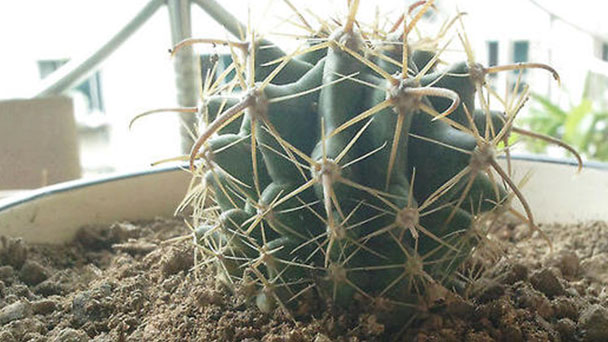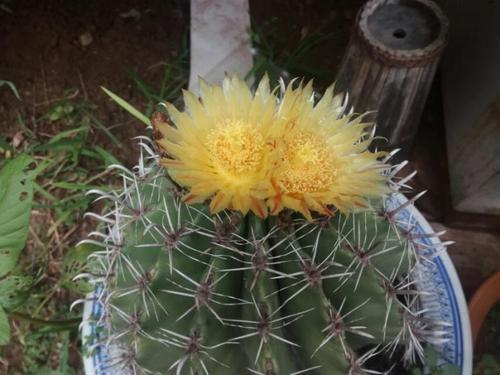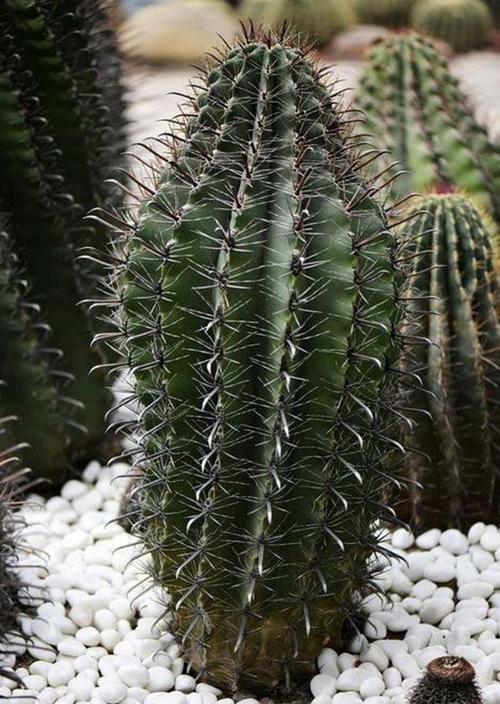Ferocactus peninsulae profile
Written by Maggie
Mar 30 2021

Ferocactus peninsulae is solitary, round to tubular, dark green. Ferocactus peninsulae often grows in the desert and other dry environments, as a kind of succulent plant. There are 5 reddish-brown spines, of which 1 is wide and flat with a hook at the tip.Spring bell-shaped flower with terminal yellow petals with purple stripes. Ferocactus peninsulae is often used for potted ornamental.
Ferocactus peninsulae picture

Ferocactus peninsulae morphological characteristics
Configuration: Ferocactus peninsulae is solitary, spherical to tubular, 30-35 cm in diameter, 70-80 cm in height
The body color is dark green. Ridge of high verrucous process of superior ridge. Stellar arrangement balance, yellow and white peripheral thorns 9-11; There are 5 reddish-brown spines, of which 1 is wide and flat with a hook at the tip. Flowers: terminal yellow bell - shaped spring petals with purple stripes, 5-5.5 cm in diameter.
Environment and distribution range of Ferocactus peninsulae
Ferocactus peninsulae often grows in the desert and other dry environments, as a kind of succulent plant.
Origin: Peninsular California, Mexico.
Ferocactus peninsulae growing method
Ferocactus peninsulae is a very easy breed to keep, with full sun exposure in all seasons except summer, when proper shading is required. The soil windmill uses peat mixed with particles of cinder river sand and so on. The soil surface is laid with clean particles of river sand, and the soil is mainly breathable. When summer temperatures are above 35 degrees, the ferocactus peninsulae will be moved to bright scattered light and slowly cut off the water. In the summer Ferocactus peninsulae dormant period little water or no water supply. In the middle of autumn the temperature down began to restore watering, winter if the temperature can maintain 0 degrees above, are water supply, 0 degrees below the water will be broken, otherwise it is easy to frostbite.

Latest Updated
- Benefits of Bugleweed - 7 Science-backed Health Benefits
- Bugleweed Dangers & Side Effects - Is It Poisonous?
- How to Plant Evergreen Trees - What You Should Know
- When to Plant Evergreens - Grow Guide for Evergreen Trees
- 12 Wonderful Evergreen Shrubs for Your Garden
- 12 Popular Evergreen Plants with Pictures for Beginners
- When And How To Prune A Lilac Bush Like a Pro
- How to Grow & Care for Lilac Vine (Hardenbergia Violacea)
- Japanese Lilac Tree (Syringa Reticulata) Care & Propagation Guide
- Shumard Oak Pros and Cons - What to Know
Popular Articles
- Winter maintenance of Antirrhinum Majus
- How to Grow Terminalia Mantaly Tree
- How to Grow and Care for Crossostephium Chinense
- How to grow Antirrhinum Majus in spring
- Peristeria Elata (Dove Orchid) Profile: Info & Care Guide
- Underwatered Snake Plant (Sansevieria Trifasciata) - Signs And How To Fix
- How to Care for Brazilian Jasmine Plant (Mandevilla Sanderi)
- How to Grow & Care for Graptopetalum Purple Delight in Summer
- Rosa Chinensis (China Rose): Plant Growing & Care Tips
- How to Care for Baby Sun Rose (Aptenia Cordifolia)